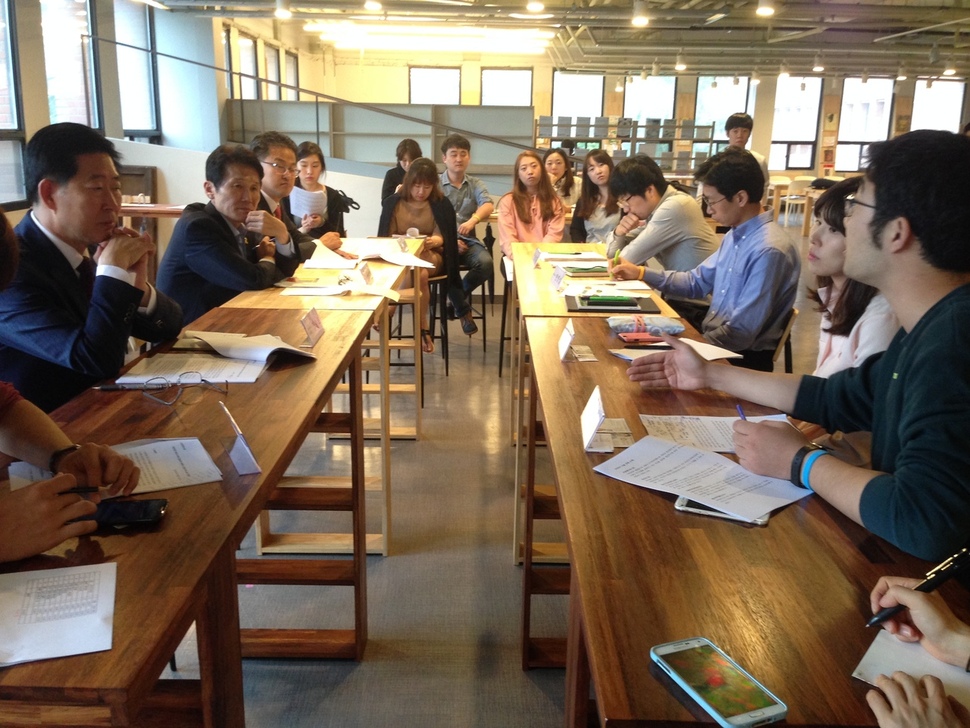Young South Koreans say they don’t want their children to inherit their kind of life
|
 |
|
Young people gathered on Aug. 31 at the Future Office at Seoul Innovation Park, located in the Eunpyeong District of Seoul, to share their candid opinions about South Korea’s low birthrate with a group of South Korean lawmakers.
|
#downsizing_population #low_birthrate #Korea
At meeting to discuss low birthrate, young people argue that gov’t needs a careful look at why young people are not getting married or having children
“I don’t want my children to inherit the kind of life I’m leading right now.” –Kwon Ji-woong, chair of the steering committee of the Seoul Youth Policy NetworkAround a dozen young people gathered on Aug. 31 at the Future Office at Seoul Innovation Park, located in the Eunpyeong District of Seoul, to share their candid opinions about South Korea’s low birthrate with a group of South Korean lawmakers.
The lawmakers are members of a National Assembly research forum that aims to find ways for lawmakers to help South Korean society overcome its extremely low birthrate.Rep. Yang Seung-jo and Rep. Kim Jeong-woo, both lawmakers with the opposition Minjoo Party of Korea, and Yun So-ha, a lawmaker with the opposition Justice Party, organized the meeting to hear from young people – the people who are, or rather aren’t, having children – about how to fix the low birthrate.
“A low birthrate is a statement by the majority of the members of a society that they do not want to perpetuate their current way of life. It amounts to a society deciding to commit suicide,” said Kwon, who is 28, during the meeting.
“Rather than trying to figure out how to encourage people to have children, we need to start with the question of how we can make people consider their lives as being worth living.”
“For structural reasons, young people who are able to enjoy the normal lives enjoyed by our parents’ generation – of dating, marrying and having children – are becoming a minority. Government policy should also begin by acknowledging the reality that young people are joining the work force later and are disinclined to get married, rather than demanding young people to get a job as soon as they graduate and to get married once they reach a certain age,” Kwon suggested.
Lim Gyeong-ji, 28, chair of the Min Snail Union, says lack of housing for young people is a reason for the low birthrate.“Since young people have low incomes and have to pay rent, it’s not very likely that they will be able to save enough money to buy a house. Instead of always coming up with supply- and loan-focused housing policies that promote home ownership, we need policies that can provide a stable lifestyle even for people who remain tenants their whole life and never manage to buy a house,” Lim said.
“Not long ago, the new chairman of the Korea Student Aid Foundation said that debt is what motivates people to work hard. But the reality is that young people face so much pressure to pay back their debts that it’s hard for them to picture a normal future,” said Han Yeong-seop, 36, director of the Youth Money Habit Training Center.
Han argues that the fact that a significant number of young people are going into debt to cover the cost of university tuition, housing, and living expenses is the main reason that they are putting off or even giving up on marriage and children.
“I’m over 30, and I’m dating someone, but even I’m still not sure whether I should get married. Rather than going on about how the low birthrate is a problem, the government and politicians need to take a careful look at why young people are not getting married or having children,” Han said.
The three lawmakers who organized the meeting said they will listen carefully to the difficulties that are actually faced by young people in a low-birthrate society and will attempt to address those difficulties through government policy. They added that they believe that this meeting should be taken as an opportunity not to simply say that Koreans need to have more children but to look at the structural problems in South Korean society.
By Hwangbo Yon, staff reporter
Original article from: http://bit.ly/2bQFBfL

